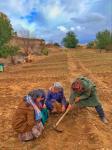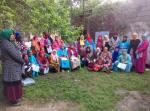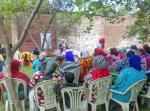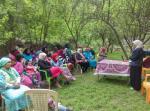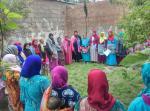My Nonprofit Reviews

Sanae Benaadim
Review for High Atlas Foundation, New York, NY, USA
Changing the Destiny of Women during the COVID-19 Pandemic
By Sanae Benaadim, HAF’s Office Manager & Volunteer Coordinator
Can you imagine that due to COVID-19, several problems related to women have only increased, but these issues haven’t been given attention? For years, different NGOs worked on empowering women and gender equality, but with the unexpected appearance of an invisible enemy (the virus), those activities that used to raise awareness about injustices and discrimination against women have been stopped.
On Tuesday, July 21, Fatima Zahra Laaribi, Administrative Support and Finance, Farmer-to-Farmer program and I participated in a virtual platform in the Multi-Stakeholder Hearing Accelerating the Realization of Gender Equality and the Empowerment of All Women and Girls as part of the preparations for the high-level meeting of the General Assembly in accordance with UN GA resolution. The virtual platform was held and facilitated by the United Nations Conference Services, and it was live-streamed on UN Web TV and social media channels. Participants entailed world leaders, NGO representatives, and intergovernmental organizations from around the world.
The main objective of the multi-stakeholder hearing was to evaluate the outcomes and recommendations of the 25-year review processes as well as the situation of women in the 64th session of the Commission. In addition, it was an opportunity to exchange experiences and lessons about women's situations among speakers from various countries through interactive dialogues for the implementation of the Beijing Declaration and Platform for Action.
I noticed that the situation of women in each country differs from their needs. One of the critical areas identified by the Beijing Declaration and Platform for Action is violence against women and education. Besides physical and sexual violence, women also experience state-perpetrated gender-based violence. Empowerment must begin from home. Both parents should equally participate in the children’s activities apart from other household responsibilities. Also, an honest and courteous exchange of ideas can plant the seed for successful equality. I believe that those three words can be the first step toward the resolution of women’s issues in general: education, empowerment, and equality.
The High Atlas Foundation’s heart is with women. It has the vision to continue to provide as much support as possible by preparing and developing new trainers for the IMAGINE Women’s Empowerment Program. Coaches will host and facilitate virtual webinars in order to train the apprentices. Once COVID-19 is under control and conditions are safe, HAF will begin direct workshops with women in their communities as always and provide them the support they need.
Review for High Atlas Foundation, New York, NY, USA
What does the 20th of January mean to HAF?
Sanae Benaadim
HAF's Office Manager and Volunteer Coordinator
Every third Monday of January, HAF takes the initiative of planting trees in different places around Morocco. I heard many positive things about this special day back when I was a volunteer. And I wished to be part of it one day!
President Dr. Yossef Ben-Meir, USAID Driver Lahcen Ait Ouatouch, the volunteer Giovanni Ferreira Cunha, Tree Monitoring Officer Hajiba Boumasmar and I headed towards Lala Takerkoust to the Ajbane Al Olfa Cooperative that produces goat cheese first before planting trees with the farmers. We met with the president of the cooperative, who shared with us glimpses of their daily hard work, such as feeding 60 sheep every day for six and a half dirhams per animal.
Hajiba and I started the activities with a speech about HAF and its missions with Moroccan communities, how it is important to plant trees around Morocco, and why HAF is working on this project. We talked with farmers, who freely expressed their gratitude towards us. They talked about the problems that they face daily, and we shared information regarding planting pomegranate trees.
After finishing the workshop, we gave the one thousand trees to the farmers. With the help of Mr. Hassan Chaarouf - to whom I offer sincere thanks for transporting us to the beautiful planting sites - we drove to see the first farmer and to plant the pomegranate trees. I saw the farmer’s strength and his love towards his land. In fact, he told us that he had previously refused many lucrative offers to sell his land for buildings.
We continued planting trees for two other farmers who lived far from each other, approximately 5 to 10 kilometers away. I was delighted at the sight of the silky soil and its color that matches the color of the mountains. It was an enjoyable atmosphere with hearts full of hope for how these trees will prosper in the future.
Review for High Atlas Foundation, New York, NY, USA
RURAL WOMEN ACHIEVE THEIR SELF-EMPOWERMENT IN TAALANIT VILLAGE
By Sanae Benaadim
HAF Volunteer
On April 4th, HAF and local Moroccan women embarked on a new, exciting adventure! HAF's team, including Fatima Zahra Laaribi, Amina El Hajjami, Houria Chouhab, Martine Roberts, and myself, went to Taalanit, a small village located in the Setti Fadma commune of the Al Haouz Province. As we approached the hillside, we passed by fascinating landscapes riddled with marvelous changing colors.
The first day of the Imagine four-day empowerment workshop began by meeting the rural women next to a local café. It was facilitated by Amina EL Hajjami, HAF's Director of Projects. Amina led this training, with the aim to help women of Taalanit empower themselves and better their livelihoods.
Amina started the workshop in the local language of Tashelheit with a brainstorming activity of introductions, challenges, motivation, and available solutions. This method had an effective way of breaking the ice with the 46 participants aged between 16 and 60 years old, most of whom do not speak Arabic. Although there were no responses at first, caused by a lack of understanding regarding new concepts and words such as “training,” one woman had the courage to take initiative in answering some questions. As a result, others were encouraged to participate in the discussion as well.
As discussions unfolded, women spoke up about the different factors controlling them, such as traditional rituals and social norms in their community. The following statements particularly caught my attention:
“Whatever we do, men do not give verbal recognition of our hard work.”
“When [men] just speak, we fear.”
“We are selling ourselves to men.”
“Men are not normal if they help their wives.”
In my opinion, male domination is highly prevalent; they have the upper hand in rural areas of Morocco. I have been told that most rural Moroccan women have only two advances in life: the first is to move from their parents’ house to their husband’s; the second is from their husband’s house to the grave.
The second day of the training was a surprise to us as the participants enthusiastically arrived full of wonder and ready to explore. This time, they had the will and passion to make progress in their lives. Amina led a “room exercise” for determining the women’s weaknesses and strengths. We found that sources of personal power are commitment, discipline, inner guidance, a support system, lightness, love, and finding your own truth. Additionally, any activity we need to accomplish requires the power of imagination, which fosters passion to achieve dreams and, thus, leads to happiness.
Education is also very important in life. Notably, I observed that in every meeting we facilitated, most women we spoke with asked about education. Especially after learning more about Amina’s academic and professional experiences, participants developed a strong belief in a need to be educated in order to get a job and earn money of their own.
One of HAF’s important objectives is to empower rural women, guide them in having a clear vision of their lives, and to make a positive impact on them. It is often difficult for others, particularly men, to have insight into the value of women’s daily work both inside and outside of the house. The participants had voiced this value as a result of the workshop, and affirmed that if they give themselves value, then men will do the same.
Before leaving Taalanit, we asked the women what they learned from the empowerment training to which we received many positive responses. One participant said, “Unlike the past, our eyes and brains are opened now.”



